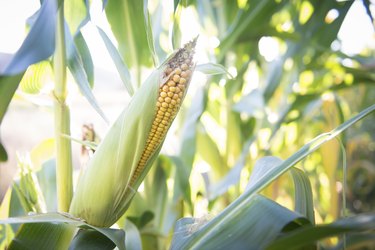
Squirrels defy most methods for protecting sweet corn -- including electrical fencing -- so the best option is to use multiple strategies to keep squirrels from eating your corn. Corn (Zea mays) is as tasty to squirrels as it is to gardeners, so once the squirrels get a taste they can do major damage to your crop. Flavoring outer ears to repel them, using deterrent odors and covering the ears may offer some protection against squirrels, yet no one method is foolproof.
Repel Them With Red Pepper
Video of the Day
Red pepper sauce made from cayenne may discourage squirrels from eating the ears. Dribble the hot sauce on outer ears that are the most accessible to squirrels. Wash your hands after applying it and be careful not to rub your eyes until your hands are clean if you get any on your fingers. The hot pepper can make corn less appetizing to raccoons, too. Washed and cooked corn won't retain any hot pepper flavor.
Video of the Day
Repel or Deflect Them
Human and predator scent may be off-putting to squirrels. Leaving human and dog hair around and between the corn plants or applying a predator scent product from a garden supplier might discourage squirrels. Blood meal sprinkled around the soil may also help to repel them. A supply of preferred squirrel food such as acorns, nuts and sunflower seeds put out in the garden before and during the sweet corn harvest might occupy the squirrels enough to leave you plenty of corn to eat.
Cover the Ears
Although it's time-consuming if you have more than a few sweet corn plants, covering the ears of corn before they fully ripen may save them from the squirrels. Big plastic cups or paper bags will cover the ears, making them less of a target for foraging squirrels. Timing is key. Unless the barriers are in place before the first ears become ripe, it will probably be too late. Once squirrels start eating sweet corn, they tend to keep at it.
Use Scare Tactics
If circumstances permit, and your location is free of predators that might harm a dog, having a dog guard your sweet corn as the ears ripen makes your crop too high-risk for squirrels. If your dog isn't much bigger than a squirrel or isn't the type to become excited by wildlife, consider borrowing a bigger, more protective dog. Garden supply vendors sell devices that make noise to scare off garden pests, but it isn't certain that these products will work for long. Most squirrels don't scare easily, especially when they smell food.